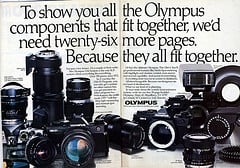Even if you’ve never met one, you can probably guess what a business writer or commercial writer does. The term copywriter is a bit more of a challenge.
Logic tells us that a copywriter writes copy. But what on earth is copy?
In marketing and advertising, the words are called copy. These words may be in print, on a website or even spoken in a podcast or video. Their purpose is twofold: to make you like a brand better and, more importantly, to persuade you to do something.
Copywriting uses a simple, conversational style
Copywriting isn’t the most challenging form of writing. In Bob Bly’s book, Secrets of a Freelance Writer, copywriter John Forde is quoted as saying, “From what I can tell, copywriting isn’t rocket science. True, it does take a certain knack — but patience and dedication will get you far.”
That’s because copywriting is different from ordinary writing. It’s more conversational. It sounds like a person talking, so it often breaks the grammar rules you learned in English class.
It’s simple, but not simplistic. More than showing or telling, copywriting is sales in print. As a result, it does require some training. The trick is to be able to identify the benefits of a product and tie them to your prospect’s deepest desires or fears.
Copywriters must overcome a significant challenge
Here’s the problem. We live in an age of information overload. It’s been estimated that Americans are bombarded with approximately 500,000 marketing messages per day.
As a result, we’ve become immune to them. Not only do we not read them, we don’t even see them.
That presents a significant challenge for marketers. If your prospects don’t read your offer, they aren’t likely to buy. So the copywriter must write a message that captures the readers’ interest and keeps them reading to the very last word.
It’s what a copywriter does with words that makes the difference
A while back, I was discussing a project with a new prospect. He had never worked with a copywriter before and was surprised at the cost. It was a leap for him to see professional copy as an investment. His complain? “It’s just words!”
Nothing could be further from the truth.
Copywriting is more than a clever play on words. It’s a strategic message that’s based on market research, product analysis and an in-depth prospect profile. It’s a mix of writing, psychology and marketing.
That’s because you must be able to do more than talk about your product. You must know how to put together an emotionally logical presentation that touches the reader on a subconscious level.
You see, people buy for emotional reasons. They only use logic to justify the purchase. Copywriters know how to use this knowledge to craft messages that appeal to the reader’s emotions, so they see the product as something they can’t live without.
Contrary to popular belief, this doesn’t require hype. It does, though, demand a good understanding of psychology.
Well written copy can transform a product into a means of self-expression and fulfillment. It makes us identify with the product and feel more attractive or successful just because we own it.
Remember the commercials pitting Mac against PC? Mac was casual, cool and artistic. PC was uptight, overworked and a little nerdy.
People who buy Macintosh computers want to be like Mac in those commercials. Apple did such a good job crafting their message that they created an aura around these computers. Owning one says something about who you are.
Now that’s the work of a good copywriter.
Are you struggling to get your message right? A professional copywriter can help you find the big idea that makes your product irresistible. If you’d like to learn more, feel free to contact me. I’d love to help.
photo credit: Nesster


